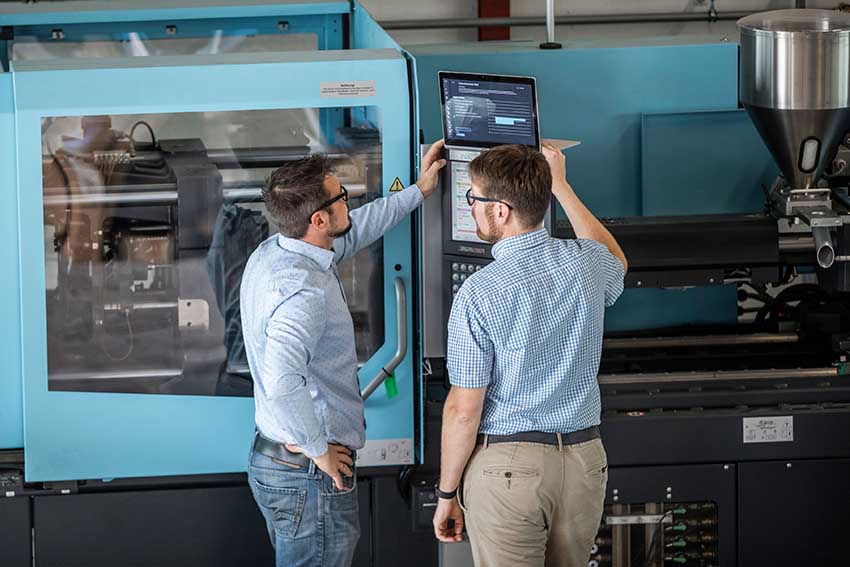SHS plus GmbH was founded in 2009 as a spin-off of the University of Duisburg-Essen and today employs a team of 17 people at its Dinslaken site. The team, which specializes purely in plastics processing, consists of engineers, computer scientists, electrical engineers and automation engineers and develops system solutions to increase the productivity and quality of plastics processing operations. With well over 100 different troubleshooting projects spread around the globe, SHS has a wide range of experience and well-known references.
Easy Engineering: What are the main areas of activity of the company?
SHS PLUS: SHS plus GmbH was founded in 2009 and has since been involved in the development of solutions for the plastics processing industry. This includes consulting services, development of control and regulation systems, automations as well as the development of software systems, simulation software and virtual assistance systems.
E.E: What’s the news for 2021 about new products?
SHS PLUS: The latest product from SHS is a software system called Vipra – Virtual Production Assistant. After SHS has worked in many different projects on customer-specific software solutions for process optimization in the last few years, the results of these projects are to be combined into a complete system under the name Vipra. The result is software platform that on the one hand includes a wide range of digitization options and machine communication solutions, but on the other hand also allows automated data visualization, data analysis and the integration of AI services. The core functions of the Vipra system are, in particular, the performance of the data pipeline and the possibility of connecting almost any machines and plants, regardless of their age. In current development projects, various AI systems are being integrated into the system, ranging from recommender algorithms to digital AI-supported training platforms.
E.E: What are the ranges of products?
SHS PLUS: SHS offers product solutions from different areas. From technical consulting services in so-called troubleshooting projects to complex machine controls based on classic PLCs (B&R and Siemens) and innovative software solutions based on microservice architectures, various products are part of the company’s standard portfolio.

E.E: At what stage is the market where you are currently active?
SHS PLUS: Typical plastics processing companies are at different stages in terms of their technological progress. While some high-tech corporations already have a wide range of data analysis and process optimization capabilities, there are other companies where machines are still operated entirely manually and where little or no digital data is collected. SHS offers different services for both types of production companies. While in the case of the high-tech company, automated data analysis, expert knowledge-based systems or live simulations tend to be more in demand, the companies in the other category tend to be more interested in system solutions that relate, for example, to the retrofitting of equipment or that enable machine communication. Thus, the market, as complex as it is, can be served by SHS with different products.
E.E: What can you tell us about market trends?
SHS PLUS: One of the strongest trends in the plastics processing industry is clearly the topic of digitalization and virtual assistance. Whereas a few years ago the focus of entrepreneurs was on energy efficiency or circular economy, today it is on topics related to process optimization through digitization or topics such as the Internet of Things. Processes are becoming increasingly digitized. More and more information is being evaluated. Data is analyzed and processes are accelerated or improved in terms of quality. A very important driver for this trend is the fact that production companies in Europe often have to calculate with higher infrastructure costs and personnel costs than their international competitors. At the same time, there is a shortage of skilled workers in countries like Germany. As a result, many companies are taking the bull by the horns and working to build economic processes with the limited human resources available through digitization and automation. In doing so, they are relying on the strength of Germany and Europe as a technology region and are relying on digital and virtual assistance systems. Even if this trend is only in its infancy in many areas, impressive solutions are already a reality today.
E.E: What are the most innovative products marketed?
SHS PLUS: These are clearly the virtual assistance systems as well as the live computer simulations or soft sensor systems we are working on. Digitization and machine communication are making it possible for the first time to have a completely digital image of reality available as a database, so that digital algorithms, artificial intelligence methods and other mathematical statistical systems can analyze and optimize this data.

E.E: What estimations do you have for 2021?
SHS PLUS: We started 2021 with very positive feelings and these are currently increasing. The pandemic seems to be slowly coming under control, incidence levels are falling and production companies are finding ways to deal with the situation safely and responsibly. At the same time, the number of people vaccinated continues to increase, and life is gradually returning to normal with lower and lower case numbers. This is also clearly reflected in the interest of companies to invest in new technologies and to take advantage of opportunities that arise. The companies have become aware that topics such as digitalization, know-how preservation in the company and assistance-supported processes can be key factors in such times that can determine success or failure. We also notice this in the demand for our solutions. Thus, our expectations for the remainder of 2021 are high. In 2022, by the way, we expect this trend to intensify significantly.

